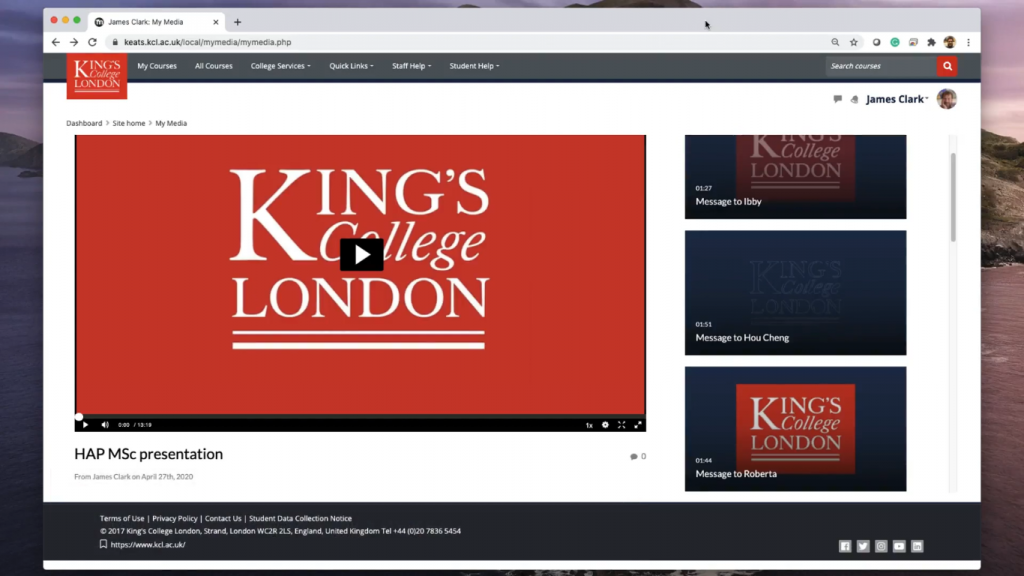In March 2020 we found ourselves needing to transition to online education as a primary means of delivering our teaching at King’s. Whilst using online resources for teaching was not new to us (we have, after all, been using Keats, Blackboard and Lecture Capture for many years to support education) it was a challenge for many of us to become accustomed to the new way of preparing and delivering education to our students. Hundreds of academics at King’s had to adapt to using Teams, chunking their lectures and uploading material in new formats to Keats; and this is even before we have to consider developing an online curriculum.
As spring turned to summer, we realized that Covid-19 was not going to go away anytime soon, and we started planning for the forthcoming academic year with the challenge of online delivery foremost in our minds.

I have been hosting a website containing tutorials (called Essential Life Science Tutorials) in which I demonstrate, through the medium of screencasts, the effective use of Microsoft office applications and selected scientific software to undertake analysis, presentation and interpretation of bioscience data..
Since we have regularly signposted this resource for educating our students and peers, I started thinking about my colleagues and how, at this busy and problematic time, providing helpful technology enhanced education-focused screencasts might make the transition to online teaching a little more palatable.
I started recording screencasts for my department (Physiology) to help colleagues set up Teams meetings, record narrated PowerPoint presentations and to help with the intricacies of Kaltura and how to use your computer as an online education tool. The first handful of tutorials were welcomed by my colleagues within Physiology and soon links to the videos were been circulated among other departments and faculties. Emails started hitting my inbox.
As the summer progressed, I was producing around 4 tutorials a week using Camtasia, form my home office, as the college and faculty produced more guidance notes for educating online. ‘Tutorials for Educators’ was born! Soon these tutorials were attracting attention from overseas and comments on YouTube and emails were coming from all over the world thanking me for the work (this is extremely flattering!). By the end of the summer there were over 50 tutorials available and even a few product reviews to help those engaged with teaching online get the most out of their skills and resources.

These tutorials were always intended for a wider audience and I long-since chose YouTube as a mode of delivery of all my screencasts. With over 14,000 international viewers (at the time of publication) these online tutorials have been of interest to a wide variety of educators throughout the world. I have started producing videos in response to staff requests and now with over 60 focused tutorials available on the YouTube channel and posted on the College Streams system.
I firmly believe that peer support is one of the foundations of higher education and without it we are fighting a losing battle to develop and innovate in education and I am not alone ( https://doi.org/10.1007/BF00138870). If one thing the Covid era has taught us is that we are in this together. We are also learnt over the past few years that listening to experts is not always easy and it is my impression that colleagues would prefer to be informed by other academics rather than getting an IT-focused approach to learning about technology. I might be wrong, but I think this might be the key going forward.
There’s nothing particularly original and new about these screencasts; YouTube, Dailymotion and Vimeo are full of peoples ideas and useful advice but it is clear that in times of need a focused and accessible source of useful (and practical) advice for online educators BY an online educator is a welcome resource.
I am still adding new tutorials every week or so, so why not subscribe yourself?
Useful Links:
Written by James Clark

Dr James Clark is a Reader in Human & Applied Physiology within the Faculty of Life Sciences and Medicine. James is an advocate of a blended approach to education in HE and has been the recipient of a King’s award for Innovative teaching (2017) as well as the Physiological Society Otto Hutter Prize for Excellence in Physiology education (2019). James teaches on multiple undergraduate and post graduate programs as well as running the MSc in Human & Applied Physiology.